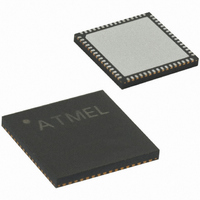ATMEGA128RFA1-ZU Atmel, ATMEGA128RFA1-ZU Datasheet - Page 421

ATMEGA128RFA1-ZU
Manufacturer Part Number
ATMEGA128RFA1-ZU
Description
IC AVR MCU 2.4GHZ XCEIVER 64QFN
Manufacturer
Atmel
Series
ATMEGAr
Datasheets
1.ATMEGA128-16AU.pdf
(385 pages)
2.ATAVR128RFA1-EK1.pdf
(13 pages)
3.ATAVR128RFA1-EK1.pdf
(555 pages)
4.ATMEGA128RFA1-ZU.pdf
(524 pages)
Specifications of ATMEGA128RFA1-ZU
Frequency
2.4GHz
Data Rate - Maximum
2Mbps
Modulation Or Protocol
802.15.4 Zigbee
Applications
General Purpose
Power - Output
3.5dBm
Sensitivity
-100dBm
Voltage - Supply
1.8 V ~ 3.6 V
Current - Receiving
12.5mA
Current - Transmitting
14.5mA
Data Interface
PCB, Surface Mount
Memory Size
128kB Flash, 4kB EEPROM, 16kB RAM
Antenna Connector
PCB, Surface Mount
Operating Temperature
-40°C ~ 85°C
Package / Case
64-VFQFN, Exposed Pad
Rf Ic Case Style
QFN
No. Of Pins
64
Supply Voltage Range
1.8V To 3.6V
Operating Temperature Range
-40°C To +85°C
Svhc
No SVHC (15-Dec-2010)
Rohs Compliant
Yes
Processor Series
ATMEGA128x
Core
AVR8
Data Bus Width
8 bit
Program Memory Type
Flash
Program Memory Size
128 KB
Data Ram Size
16 KB
Interface Type
JTAG
Maximum Clock Frequency
16 MHz
Number Of Programmable I/os
38
Number Of Timers
6
Operating Supply Voltage
1.8 V to 3.6 V
Maximum Operating Temperature
+ 85 C
Mounting Style
SMD/SMT
3rd Party Development Tools
EWAVR, EWAVR-BL
Development Tools By Supplier
ATAVR128RFA1-EK1
Lead Free Status / RoHS Status
Lead free / RoHS Compliant
Available stocks
Company
Part Number
Manufacturer
Quantity
Price
Part Number:
ATMEGA128RFA1-ZU
Manufacturer:
ATMEL/爱特梅尔
Quantity:
20 000
Company:
Part Number:
ATMEGA128RFA1-ZUR
Manufacturer:
ON
Quantity:
56 000
- ATMEGA128-16AU PDF datasheet
- ATAVR128RFA1-EK1 PDF datasheet #2
- ATAVR128RFA1-EK1 PDF datasheet #3
- ATMEGA128RFA1-ZU PDF datasheet #4
- Current page: 421 of 555
- Download datasheet (6Mb)
27.7.1 Analog Input Circuitry
8266B-MCU Wireless-03/11
3. If no other interrupts occur before the A/D conversion completes, the ADC interrupt
Note that the ADC will not be automatically turned off when entering other sleep modes
than Idle mode and ADC Noise Reduction mode. The user is advised to write zero to
ADEN before entering such sleep modes to avoid excessive power consumption.
The analog input circuitry for single ended channels is illustrated in
An analog source applied to ADCn is subjected to the pin capacitance and input
leakage of that pin, regardless of whether that channel is selected as input for the ADC.
When the channel is selected, the source must drive the S/H capacitor through the
series resistance (combined resistance in the input path).
The ADC is optimized for analog signals having output impedance Z
approximately 3 k
negligible. If a source with higher impedance is used, the correct sampling time will
depend on how much time is needed to charge the S/H capacitor, which can vary
widely. The user is recommended to only use low impedance sources with slowly
varying signals, since this minimizes the required charge transfer to the S/H capacitor.
The required tracking time (input sampling switch closed) t
can be estimated to
for Z
guaranteed by the conversion logic. Based on the ADC clock frequency the bits
ADTHT[1:0] of register ADCSRC allow the adjustment of the tracking time to the user’s
requirements.
Tracking time requirements should also be considered for the differential mode. The
input signal is sampled by the gain amplifier. The value of the input capacitance C
depends on the selected gain (~7pF for 200x gain, <1pF otherwise). The tracking is
equal to 50% of the clock period of CK
frequency is required for input sources with high impedance.
Figure 27-11. Analog Input Circuitry
Signal components higher than the Nyquist frequency (f
either kind of channels, to avoid distortion from unpredictable signal convolution. The
user is advised to remove high frequency components with a low-pass filter before
applying the signals as inputs to the ADC.
will wake up the CPU and execute the ADC Conversion Complete interrupt routine.
If another interrupt wakes up the CPU before the A/D conversion is complete, that
interrupt will be executed, and an ADC Conversion Complete interrupt request will
be generated when the A/D conversion completes. The CPU will remain in active
mode until a new sleep command is executed.
OUT
> 3k
(worst case: maximum input step). A minimum tracking time of 500ns is
A D C n
or less. If such a source is used, the sampling time will be
t
DTRCK
=
(
I
I
IH
IL
Z
OUT
ADC2
/
k
Ω
. Hence in differential mode a slower clock
+
2000
2 k
)
ATmega128RFA1
⋅
. 0
V
ADC
097
A V D D
DTRCK
/2) should not be present for
/2
ns
C
S /H
to settle to within 1 LSB
= 1 4 p F
Figure 27-11
OUT
below.
421
S/H
of
Related parts for ATMEGA128RFA1-ZU
Image
Part Number
Description
Manufacturer
Datasheet
Request
R

Part Number:
Description:
Manufacturer:
ATMEL Corporation
Datasheet:

Part Number:
Description:
Microcontroller with 128K bytes In-system programmable flash, 8 MHz, power supply =2.7 - 5.5V
Manufacturer:
ATMEL Corporation
Datasheet:

Part Number:
Description:
IC AVR MCU 128K 16MHZ 5V 64TQFP
Manufacturer:
Atmel
Datasheet:

Part Number:
Description:
IC AVR MCU 128K 16MHZ 5V 64-QFN
Manufacturer:
Atmel
Datasheet:

Part Number:
Description:
IC AVR MCU 128K 16MHZ COM 64-QFN
Manufacturer:
Atmel
Datasheet:

Part Number:
Description:
IC AVR MCU 128K 16MHZ 64-TQFP
Manufacturer:
Atmel
Datasheet:

Part Number:
Description:
IC AVR MCU 128K 16MHZ 64-TQFP
Manufacturer:
Atmel
Datasheet:

Part Number:
Description:
IC AVR MCU 128K 16MHZ IND 64-QFN
Manufacturer:
Atmel
Datasheet:

Part Number:
Description:
MCU AVR 128KB FLASH 16MHZ 64TQFP
Manufacturer:
Atmel
Datasheet:

Part Number:
Description:
MCU AVR 128KB FLASH 16MHZ 64QFN
Manufacturer:
Atmel
Datasheet:

Part Number:
Description:
MCU AVR 128KB FLASH 16MHZ 64TQFP
Manufacturer:
Atmel
Datasheet:











